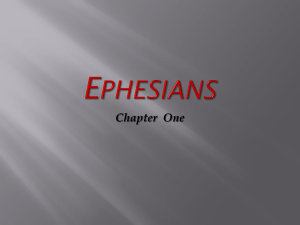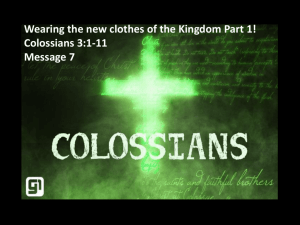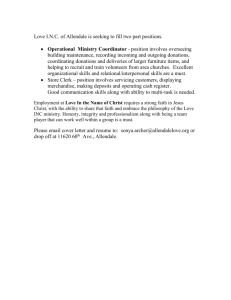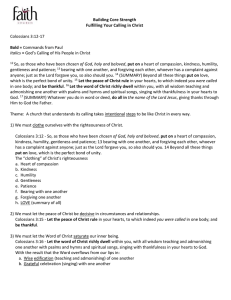Notes
advertisement
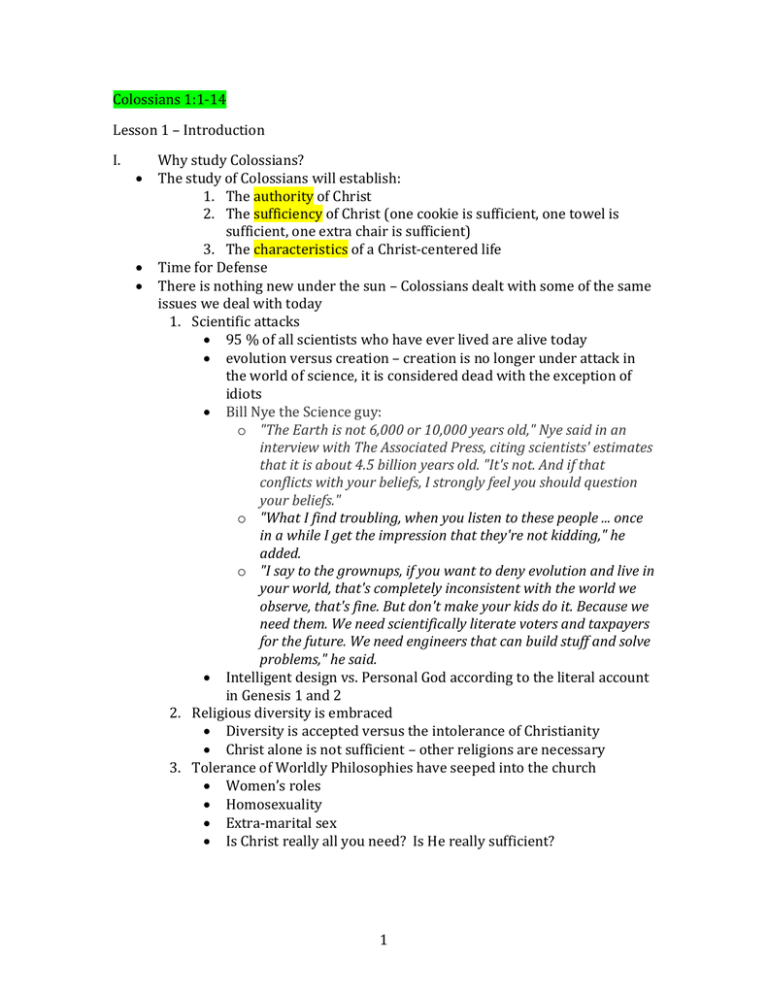
Colossians 1:1-14 Lesson 1 – Introduction I. Why study Colossians? The study of Colossians will establish: 1. The authority of Christ 2. The sufficiency of Christ (one cookie is sufficient, one towel is sufficient, one extra chair is sufficient) 3. The characteristics of a Christ-centered life Time for Defense There is nothing new under the sun – Colossians dealt with some of the same issues we deal with today 1. Scientific attacks 95 % of all scientists who have ever lived are alive today evolution versus creation – creation is no longer under attack in the world of science, it is considered dead with the exception of idiots Bill Nye the Science guy: o "The Earth is not 6,000 or 10,000 years old," Nye said in an interview with The Associated Press, citing scientists' estimates that it is about 4.5 billion years old. "It's not. And if that conflicts with your beliefs, I strongly feel you should question your beliefs." o "What I find troubling, when you listen to these people ... once in a while I get the impression that they're not kidding," he added. o "I say to the grownups, if you want to deny evolution and live in your world, that's completely inconsistent with the world we observe, that's fine. But don't make your kids do it. Because we need them. We need scientifically literate voters and taxpayers for the future. We need engineers that can build stuff and solve problems," he said. Intelligent design vs. Personal God according to the literal account in Genesis 1 and 2 2. Religious diversity is embraced Diversity is accepted versus the intolerance of Christianity Christ alone is not sufficient – other religions are necessary 3. Tolerance of Worldly Philosophies have seeped into the church Women’s roles Homosexuality Extra-marital sex Is Christ really all you need? Is He really sufficient? 1 II. Colossians – the basics A. Author – Paul Born around the turn of the century Born in the Roman city of Tarsus (in Turkey) Jewish heritage through parents, Roman citizens Tent maker by trade Son of a Pharisee Raised orthodox At age 13, he was sent to Jerusalem to study under the famous rabbi, Gamaliel o Grandson of Hillel o Hillel (liberal – more open minded and generous with the law) vs. Shammai (conservative – more narrow minded and literal) o Acts 5 – Sanhedrin sought to kill the apostles – Gamaliel said if it is not of God it will pass away – rumors of his conversion are questionable o When he died, “since rabbi Gamaliel died, the glory of the Lord has ceased” Pharisee himself – this was his chosen field (scribe, Pharisee, Sadducee) By 30, acknowledged religious leader in Israel – extremely intelligent and aggressive – mind of a lawyer Small in stature – red head – unibrow? He had a physical hardship (some say eyesight, some say deformity) – thorn in the flesh Vigorously opposed Christianity Aggressively pursued believers – first seen at the stoning of Stephen Jesus personally stopped Paul (Saul) in his tracks on the road to Damascus and opened his eyes – took off the blinders Early church leaders initially questioned the sincerity of Paul’s conversion Being a Jewish Roman, he naturally bridged the gap between the Jews and the Gentiles He went on 3 missionary journeys Wrote 13 letters that are in the NT Imprisoned Beaten with rods Flogged 5 times – 39 lashes Stoned Shipwrecked Abandoned in water for a night and a day Hungry, thirsty, cold Endangered by nature, robbers, Romans and false teachers Executed in Rome (road outside of Rome) around A.D. 66 or 67 B. Date and location 2 AD 61 Written in a Roman Prison C. Written to? Gentile church at Colossae 100 miles east of Ephesus gospel was brought to Colossae by an associate of Paul’s – Epaphras Paul never visited but was kept informed through Epaphras Epaphras was referred to by Paul as “dear fellow servant” and “my fellow prisoner” D. Why written? The world and the flesh had a strong pull on the church Consisted of Jews and Gentiles – Judiasm legalistic roots and paganism were strong False doctrine was seeping into the church o Greek Gnosticism (philosophy + knowledge) plus Judaistic legalism = Colossian heresy o Colossian heresy 1. Rejected the deity of Christ – good cannot be embodied in evil 2. Secret code to God (Gnostics) Read Hughes 14-15 Paul’s message – get back to the basics! Christ ALONE is all you need You are complete in Christ! III. Getting the ball rolling - Intro to the letter to the Colossians – Colossians 1:18 A. The Greeting – v. 1,2 1. Paul Apostle – one chosen and sent with a special commission as the fully authorized representative of the sender By the will of God – conversion! Timothy – spiritual son of Paul 2. To the saints and faithful And = even Saints – Greek word for separation – separated from sin, set apart for God – holy – set apart Faithful – faith in what? Jesus – person and work of Christ – faith set them apart 3. Grace and peace Greeting used in all 13 letters Grace – Greek greeting – chairem (May life have ease and forgivness) – here it is charis – the active work of God’s saving grace Peace – well being that springs forth from the presence of God in one’s life – Jewish greeting – because of God’s saving grace, may you experience His peace 3 B. Thankfulness for the 3 biggies! v. 3-5 Paul commends the church for their reputation of possessing the fruits of the gospel 1. Faith – pistis – being persuaded that something is true and believing it (wheelbarrow across Niagara – not only persuaded but actually got in!) They believed in Jesus Christ – “lean your whole weight upon” Based on fact, grounded in evidence – not just looking at a drawing of an empty chair – seen it personally, seen someone sit in and chose to sit in yourself 2. Love for all the saints Agape – this is not an emotional, sentimental feeling for another, but a self-sacrificing action that puts another’s needs before ourselves One of the visible fruits of true faith is a love for other believers John 13:34,35 I John 3:10,14,15 I John 4:20 3. Hope – v. 5 Zondervan – not mere expectation and desire, but trust, confidence and refuge in God Faith and love spring forth out of hope This is a hope which causes a believer to forsake glory, comfort and satisfaction here on hearth for future glory in eternity in Christ Hope that is based on faith that the future holds something far greater than the present i.e. Moses – Hebrews 11:24-27 why did Moses give it all up? v. 26 – what is the reward? I often think throughout the day – in heaven, I won’t ache when I wake up, my bad knee won’t ached when it rains, I won’t miss my father…the hope of even simple pleasures! C. The truth of the gospel – v. 6 1. It is universal – not just a local religion but has spread throughout the world Matthew 24:14 John 8:12 – “Light of the World” not just the “Light of Israel” Romans 1:8 Revelation 7:9-10 2. It is productive (or reproductive) It is alive and powerful It changes lives How does it bear fruit? The spiritual growth of a believer will lead to new converts – this is not an internal religion with no external consequences – it is lived out in the life of each believer 3. It comes because of God’s grace 4 Salvation, changed lives, comes only by the grace of God – it is a gift we don’t deserve We do nothing to obtain salvation, it is a gift of God by His gracious act of sacrifice (Jesus in my place) Titus 2:11,12 4. God uses man to spread His gospel Epaphras was Paul’s minister to the Colossians – a servant of Christ Love in the Spirit – faith, hope and love for each other, kindled and maintained by the Spirit Although salvation is by God’s grace alone, He chooses to use obedient men to draw sinners to Himself IV. Paul’s Petition and Thankfulness– Colossians 1:9-14 A. Knowledge – v. 9 For this reason – because of their strong testimony, Paul prayed for increased knowledge Unceasing prayer – to view everything in relation to God – an ongoing, daily dialogue with an ever present God 1. Filled – completely controlled 2. Knowledge Gnosis – regular Greek word, as in Gnostics – body is bad, spirit is good – gaining knowledge is good but it doesn’t matter what you do with it because the body is evil Paul used epignosis – it means deep, thorough knowledge Paul prayed that the church would be completely controlled with the thorough knowledge of God’s will How do we obtain that knowledge? The will of God can be found in His Word 1. We must desire it 2. We must depend on the Holy Spirit to reveal truth to us 3. We must study His Word God’s will is not a secret – it is revealed in His word through the work of the Holy Spirit B. The Results of acquiring knowledge – v. 10-11 1. A pleasing, worthy walk Walk – daily conduct How are we to walk according to the Word? o In humility (Eph 4:1-3) o In purity (Romans 13:13) o In contentment (I cor. 7:17) o By faith (2 Cor. 5:7) o In good works (Eph. 2:10) o In love (Eph. 5:2) o In light (Eph. 5:8) o In wisdom (Eph. 5:5) o In truth (III John 3,4) 5 2. Fruitfulness Godly living produces fruit – Galatians 2:20 New converts Lack of fruit can be drawn to a lack of knowledge (You do what you do and feel how you feel because you think what you think) 3. Spiritual growth The more medical knowledge a student receives, the more doctor-like he becomes The more you understand God’s word, the more you will become like Christ Characteristics of spiritual growth 1. love for the Word – Psalm 119:97 2. obedient lifestyle – I John 2:3-5 3. larger, stronger faith – II Thess. 1:3 4. Strength and joy for enduring trials steadfastness – patience in circumstances patience – patience with people both have the underlying thought of difficult times and people knowledge provides strength to endure and the joy of understanding during the trials – God is in control! C. Thankfulness – v. 12-14 Paul lays out the fundamentals of the doctrine of salvation in these next verses 3 reasons for thankfulness: 1. Inheritance Father, not judge – changed relationship from condemned to child Qualified us – we were unqualified (Eph. 2:1-3) We were only qualified to receive His wrath But by His grace, mercy and sacrifice He has saved us Qualified means given a “portion of the lot” What is our inheritance? 1. eternal life – Matt. 19:29 2. the earth – Matt. 5:5, Rev. 20:6 3. promises of God – Hebrews 6:12 Saints – those set apart to God – I Cor. 6:9-11, Eph. 5:5, Galatians 5:19-21 In the light – truth, purity, holiness 2. Deliverance To draw, to rescue Thanks to the Father who has rescued us from the clutches of Satan 3. Transference To remove or change 6 The Father rescued and changed our domain into the clutches of Christ Kingdom – present tense – experiencing a relationship with Christ ruling right now In Christ we have: 1. Redemption – to deliver by payment of a ransom, freeing slaves, emancipation – same word as redemption in the Greek 2. Forgiveness – to pardon – Psalm 103:12 Because Christ redeemed us, God forgave us! Application: This is a pretty streamlined study – we’re going to go through the book, verse by verse and hit the basic principles so when we’re done, you’ll have a general understanding of the book of Colossians. But there is more you can do. Today, we breezed through the introduction and the first 14 verses – there is a lot of truth and meat in there and it is my hope that you will go back over your notes and hit the homework, and then work through the homework. This is a six-week commitment to immerse yourself in this letter to a church which could have been written today. Do your homework – take the time, and it will take time – and see what the Lord teaches you. Some of the lessons I have combined so that we can get through this book – so some of the homework is going to take a longer time to do. Are you up to the challenge? Here are three quick application points from Paul’s prayer and encouragement to this church: 1. We need to pray for others in the same manner that Paul prayed for the Colossian’s church – pray for the knowledge and conduct of fellow believers. Don’t wait for a crisis – pray now! Who? Pastors, wives, youth workers, children’s workers, elders, nursery workers, musicians…how about the family that sits at the end of your row each week? 2. We need to review our knowledge level – there are great benefits in acquiring knowledge as long as we are doers of the Word, not just hearers only – go back over these first 14 verses think through what it teaches about the character of God 3. We must have thankful hearts for our salvation – DAILY! Evidence of Satan’s grip is everywhere – aren’t you thankful you are in the warm embrace of the Savior? Then tell Him…DAILY! 7



